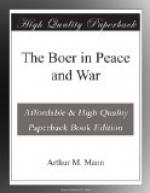Apart from the Government of the country, it may be interesting to reflect upon the opinions of the burghers themselves, i.e., the Dutch burghers. The majority of the young men originally favoured the action of the Volksraad. They had not tasted war; they had only heard about it; and their contempt for the English race generally suggested a trial. Their enthusiasm was undoubtedly great, and the idea of lending a helping-hand to another country evidently fascinated them. But their elders have now come to look upon interference as bad policy, and they dread the possibility of handing over their possessions to the wily Basuto. The feelings of the Free State Boers towards their English friends were scarcely so vindictive as in the Transvaal, but perhaps that is because there are no gold mines in the Free State.
CHAPTER V
It must not be supposed that the intelligent Boer is non-existent; but, as I have said, he is in the minority. He reads the newspapers, and he has a great deal to say on both sides. He has very few personal prejudices; his whole concern is concentrated in a desire to further the progress of the country. His mind is developed; he does not regard the Englishman as an interloper; he wants ‘to live and let live.’
There is, unfortunately, the other element, a most undesirable one—the Boer who is continually stirring up ill-feeling. You will find him everywhere, and he is always at it. If his own brother happened to be an educated man, he could not get on with him; his nature is despicable. President Kruger thinks that race hatred will gradually disappear, for ’wherever love dwells, prosperity must follow.’ Can anyone imagine love existing in the nature of the man I have cited? President Kruger himself is an educated man, an able man in his own sphere. If he practises the art of brotherly love to the same extent that he preaches it, why does he not make some arrangement by which it would be possible to instil a portion of the sentiment into some of his erring children? Then we should have no more racial hatred to concern ourselves with; we should have instead the inspiring spectacle of a reclaimed Dutchman falling upon the neck of his English next-door neighbour and weeping.
At the same time, however, even supposing Oom Paul’s influence were capable of producing such picturesque results, it would be well meantime if a little fundamental education could be introduced. This may seem impracticable at the first blush, considering that the population is so widely scattered, but no doubt there is some hidden solution. Ignorance is accountable in a great measure for the ill-feeling which exists between Dutch and English, and rancour cannot be removed until ignorance is ordered out through the back-door.
[Illustration: RAADZAAL, or Boer Parliament house.]




